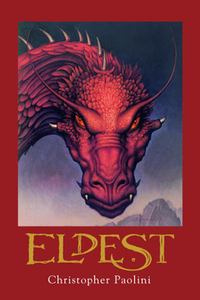
In the second installment of author Christopher Paolini’s Inheritance Cycle, which the writer dedicates to family and friends, Eragon and his dragon Saphira have just saved the Varden from the forces of the ruler of the Empire, King Galbatorix, and now must travel to the land of the elves, Ellesméra, to further his studies in magic and swordsmanship so he can be a better Dragon Rider, although he knows not whom he can trust, given occasional chaos and betrayal. In the meantime, his cousin Roran deals with his own struggles back home in Carvahall, potentially endangering Eragon.
Preceding the main text is a synopsis of the first installment of the tetralogy, in which Eragon had discovered a polished blue stone in the Spine that turned out to be a dragon egg from which his dragon Saphira hatched, becoming a Dragon Rider capable of casting magic. When humans arrived in the novels’ setting, Alagaësia, they too became part of the mentioned order. A Dragon Rider named Galbatorix had his own dragon killed by Urgals, driving him mad and provoking him to steal another dragon, decimating the order, with the beetle-like Ra’zac seeking the egg Eragon got from the Spine.
Eragon ultimately names his dragon and embarks upon an adventure with Carvahall’s storyteller Brom, finding that he’s part of the insurgent group the Varden after meeting with his friend Jeod. Eragon is captured by the enemy yet escapes imprisonment with the elf Arya, and finds further companionship in Murtagh, the son of Morzan, the last of the Forsaken. Following the battle at the headquarters of the Varden, Eragon falls unconscious but ultimately recovers, telepathically communicated to by the being Togira Ikonoka, who tells him to go the elven land of Ellesméra.
Three days after the battle at Tronjheim, with Eragon having earned the title of Shadeslayer for defeating Durza, although doing so was luck for the Dragon Rider, since Arya had destroyed the giant gem Isidar Mithrim to distract Durza and allow Eragon to kill him. His companion Murtagh is captured by Urgals, and Ajihad urges Eragon to not let the Varden fall into chaos, given their eventual search for a new leader, with various factions manipulating the Dragon Rider. As Saphira delights in her newfound firebreathing capabilities, Nasuada is suggested as the successor to leadership of the Varden.
Meanwhile, back in the ruins of Carvahall, Roran hunts among the remains of his abode, blaming his cousin Eragon for the death of his father Garrow. A magician named Trianna urges Eragon to go to Ellesméra with Arya to hone his skills, and thus, the two leave, traveling with a few dwarves who go northward on rafts. They eventually reach he wilderness harboring the elves known as Du Weldenvarden, where Eragon trains. In the battle concluding the second book, certain twists occur, alongside the eventual reunion of Eragon with his cousin, who with fellow villagers dealt with the Ra’zac.
Paolini follows the main text with a helpful pronunciation guide, and indications in his acknowledgements section that he began creating his series when he was but fifteen years old, thanking his parents, sister, and editor, and noting that when he published the second book at twenty-one, his series was still a trilogy. After this is a history of Alagaësia, called in-universe the Domia Abr Wyrda, the name Alagaësia itself meaning fertile land. Dwarves provide the most accurate calendar for the universe, with the present time in the tetralogy’s chronology being 7982 After Creation by the god of the dwarves.
The author provides a databank and a sample chapter from the series’ third entry where Eragon and Roran ride Saphira together, and his biography notes that the scenery of his native State of Montana partially inspired his literary creations. Overall, the second entry of the Inheritance Cycle is pretty much on par with its predecessor, which is a good thing, even if the franchise is somewhat derivative of other works such as the Star Wars saga. Paolini occasionally provides interesting twists on mythological creatures, such as dwarves having seven toes on each foot, which very much helps his novels stand apart from other fantasy narratives.
No comments:
Post a Comment